Soldiers of the Long White Cloud: The Maori Battalion's Heroic Path
So, in New Zealand, a military unit was created, fully staffed by Maori - the indigenous inhabitants of the islands. The 28 Battalion of the New Zealand Army, which entered history as a “Maori battalion”, was noted for high combat capability, courage of its servicemen (German General Ervin Rommel is credited with the phrase “Give me a Maori battalion and I will conquer the world.”), but most importantly, it gave the opportunity to use Maori military traditions in the interests of not only Novaya Zeeland, but also of the British Empire, whose dominion was this Pacific state.
Maori Wars
Indigenous people of New Zealand, Maori, belong to the Polynesian group of the Austronesian language family. In Polynesia, Maori were considered one of the most developed and powerful nations. Today, their number is about 700 000 people, which is very significant for small Oceanian ethnic groups. Populating the islands of New Zealand approximately between the 9th and 14th centuries, the Maori created a unique culture, with their own political and military traditions. They strongly resisted any attempts by European navigators to settle on islands that had the Maori name Ao Thea Roa (Long White Cloud).
After the spread of fire on the islands weapons Tribal clashes, which on the land of the Long White Cloud and so were quite frequent, took on a more bloody and bitter character. They went down in history as "musket wars" and became one of the formal reasons for the increased presence of the British on the islands. In the musket wars of the first half of the 19th century, 18,5 thousands of people died in total.
With regard to the 100-thousandth number of all Maori at that time - this is a very significant figure. As a matter of fact, the colossal human sacrifices for the British were an excuse, as they would say now, for the deployment of a peacekeeping contingent on the New Zealand Islands. Of course, in reality the British set themselves the task of political and economic subordination of the New Zealand lands, but they formally stated that their presence on the islands was caused by the desire to “bring to peace” the Maori tribes fighting so hard against each other.
However, Maori, of course, did not want to obey the colonialists. The Maori resistance of the British colonization of the islands was most active when, from the middle of the 19th century, numerous European immigrants began to arrive. The aborigines of New Zealand did not like that the visitors seize their land, build farms and villages. Began armed resistance to colonization, which went down in history as the Maori Wars.
The Anglo-Maori Wars went from 1845 to 1872. and were characterized by many years of heroic resistance to the superior forces of the colonialists. There are certain similarities between the wars of the North American Indians against the settlers - the colonialists and the Maori wars in New Zealand. Thus, Maori not only fought with the British military units, but also attacked the settlers, destroying their farms. Maori’s brutality against the white settlers did take place, but we should not forget that they showed it in the first place, fighting for their living space, which was occupied by the British colonialists.
The introduction of the Maori king’s post in 1850 did not, as the British had hoped, liberalize the positions of the aboriginal tribes on the lands on which white colonists settled. Most of the Maori tribes did not want to sacrifice their lands in the interests of whites, even on the condition that the latter were ready to give Maori a certain degree of autonomy in internal affairs.
Since by the middle of the 19th century, firearms brought by settlers appeared in New Zealand, Maori gradually began to acquire it for themselves and master the tactics of fighting with firearms. This greatly complicated the task of conquering New Zealand lands. In 1863-1864 The British sent General Duncan Cameron to the island, who was a veteran of the Crimean War and had a great combat experience. Despite this, the Maori resisted stubborn resistance and the outnumbering 15-thousandth army of colonialists and settlers, failed to finally defeat the 5-thousandth units of the New Zealand aborigines.
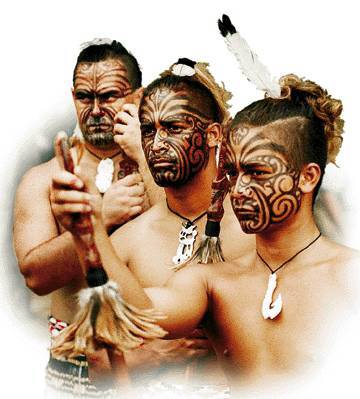 It was not until the end of 1870 that British troops left New Zealand, and instead the first military units of the Dominion, staffed by European settlers, were formed. They were also assisted by the Australian armed forces in the fight against Maori rebels. Of course, in the end, the displaced people managed to break the resistance of the Maori, however, there is still some negative in relations between the New Zealand authorities and the Maori. Many Maori are suing the island’s authorities, demanding the return of land seized from their ancestors by settlers at the end of the 19th century.
It was not until the end of 1870 that British troops left New Zealand, and instead the first military units of the Dominion, staffed by European settlers, were formed. They were also assisted by the Australian armed forces in the fight against Maori rebels. Of course, in the end, the displaced people managed to break the resistance of the Maori, however, there is still some negative in relations between the New Zealand authorities and the Maori. Many Maori are suing the island’s authorities, demanding the return of land seized from their ancestors by settlers at the end of the 19th century. Ultimately, Maori currently, even despite the favored policies of the New Zealand governments, live in worse social and economic conditions than whites. This is primarily due to the fact that a significant part of Maori could not fully adapt to modern living conditions, although it lost a significant part of a unique national culture (today only 14% of Maori constantly use the national language in everyday communication). In general, the indigenous people of New Zealand are experiencing many problems characteristic of postcolonial societies, and even significant preferences in the form of social protection and support from the authorities cannot offset the negative consequences of the destruction of the national culture in the overall process of "catching up to modernization" of New Zealand society.
It is noted that Maori have a higher level of crime, alcoholism and drug addiction, which is also attributed by New Zealand sociologists to the phenomenon of the “warrior gene”, which is present in most Maori men and causes them to behave aggressively and often asocially and antisocial in their daily lives. In this situation, it is impossible not to recall that in hostilities, the aggressive behavior of the Maori played a great service to the New Zealand High Command and the British who used the New Zealand armed forces.
Maori Pioneer Battalion
Maori integration into New Zealand society, created by immigrants from Europe, primarily the British, was relatively slow. And one of the important roles for her was the involvement of Maori in military service in the New Zealand army. Since New Zealand was British dominion, its armed forces were used in the interests of the British crown and were involved in defending the interests of Great Britain in both world wars, as well as in numerous conflicts in the countries of Southeast Asia and Oceania. The formation of the New Zealand army began in the XIX century on the basis of paramilitary self-defense detachments created by white settlers and run-in in clashes with Maori rebels. A little later, when the armed forces of New Zealand were finally formed, the British Empire as a metropolis began to actively use them in the overseas territories as an expeditionary force. So, New Zealanders fought in the Anglo-Boer Wars, the First and Second World Wars and many post-war conflicts - the Korean War, the fighting in the Malacca Peninsula, the war in Vietnam, East Timor, Afghanistan and so on.
Naturally, the use of the New Zealand army in hostilities in overseas territories sooner or later raised the question of whether Maori should be called up for military service, because otherwise there would be open injustice — the tasks of armed defense of New Zealand interests (read — the interests of the metropolis, British Empire) would be carried out exclusively white. So in government and parliamentary circles of dominion, which in the early twentieth century was New Zealand, the idea of forming a Maori unit began to be discussed.
Initially, white New Zealanders, remembering the relatively recent Maori wars, were not going to turn Maori units into regular and combatant units. It was assumed that Maori could be used in ancillary work as military construction and engineering units, which minimizes the risks of possible problems in case of unrest in Maori units, since military builders or engineers in armament and combat training cannot compare with combatant units.
In 1915, the Maori Pioneer Battalion was created, which included immigrants from New Zealand and some other Pacific islands. As the name implies, the battalion was intended for engineering-sapper work at the front. It consisted of four companies, each of which included two platoons staffed by Maori and two platoons staffed by Europeans. He was incorporated into the ANZAC - Australian-New Zealand Army Corps, consisting of divisions manned in the British dominions of Australia and New Zealand and deployed for combat operations in the Middle East and Southern Europe.
The combat path of the pioneer battalion began with a dispatch to a training center in Egypt, from where a part was transferred to Malta and then used in combat operations in Gallipoli, where the battalion arrived on July 3 of the year 1915. Initially, the British command planned to use Maori units to reinforce the New Zealand armed forces fighting on the Western Front, but then it was decided not to crush the battalion and use it as a separate unit.
During World War I, 2227 Māori and 458 representatives from other Pacific nations served in the battalion. The pioneers performed tasks on the construction of earthen fortifications, were used in the construction of railway lines and installation of wire barriers, participated in agricultural work, that is, as it was intended, they were more like a “labor” subdivision. After the end of the First World Battalion, he returned to New Zealand, where he was disbanded, and Maori who served in it were demobilized.
On the eve of World War II, Maori representatives in the New Zealand Labor Party began lobbying hard for the idea of creating a new purely Maori military unit that would allow the Aboriginal people of New Zealand to revive their military traditions and worthily be noted in military service. Moreover, the intensification of hostilities in Southern Europe, the Middle East and North Africa demanded that the British use military units manned in these regions with people from countries with a similar climate. As in the First World War, colonial troops from British India plus the armed forces of the British dominions - Australia and New Zealand - were considered the most suitable for participating in hostilities in the Mediterranean.
Maori 28 Battalion
In 1940, the Māori unit was established as the 28 Battalion as part of the New Zealand 2 Division. Initially, the battalion was staffed by Maori, but they preferred to put New Zealand officers of European descent to officer positions. Obviously, this command of the New Zealand Army sought to minimize the risks of possible unrest in the battalion. However, it turned out exactly the opposite - Maori soldiers also demanded Maori officers. Nevertheless, Major George Dittmer became the first commander of the battalion, and Major George Bertrand, half Maori by nationality, became his deputy. Both officers were experienced military personnel who had gone through the First World War. As the battalion participated in the fighting, the number of Maori officers in the unit increased, and in the second half of the war Maori also appeared among the commanders of the battalion.
The recruitment of troops to the battalion was carried out in consultation with the leaders of the Maori tribes, from among men at the age of 21-35 years. Initially, only single men who had no children were recruited, but the growing need for human resources resulted in the fact that Maori, who had no more than two children, were accepted into the battalion during the war period. Initially, 900 people were recruited as privates. As for the officers, the volunteers were trained in the officer school in Trentham. 146 volunteers were recruited to join the Maori battalion officers. The officers who were called up for military service from the reserve also had to undergo retraining at a military school in order to recall the old combat skills and learn new knowledge, including military technical ones.
The structure of the battalion consisted of five companies, denoted by the letters of the Latin alphabet. The first company was a staff, four companies - rifle. The acquisition of companies was carried out on a tribal basis, so Maori from North Auckland were recruited into Company A, Maori from Rotorua, Lake of Plenty and Thames-Coromandel Bay from company A, and Company C from Gisborne and East Cape from Company A, were recruited into Company A. “D” company - from Vacaito, Wellington, South Island, Chatham archipelago and Sikaian Atoll.
The training of the battalion servicemen was delayed because the unit being formed was experiencing a perceptible shortage of technical specialists. Such military specialties as “driver” or “signalman” could not be staffed with already trained personnel, since Maori arriving from rural areas did not have similar civilian specialties. However, the 13 March, March 1940, the battalion was armed, and after a rest and exercise, the 1 of May 1940, was sent to Scotland. At the time of dispatch, the battalion consisted of 39 officers and 642 privates.
The battalion deployed to Scotland was tasked with implementing the defense of Great Britain, so the military unit was inspected by King George himself, who remained extremely satisfied with the combat and physical training of the New Zealand military. However, later the British command changed the plans for the battalion, since it became obvious that the Germans could not yet land on the coast of the British Isles. Therefore, in December and January 1941, in two batches, the soldiers of the battalion were transferred to Egypt, from where they arrived in Greece. Greece at that time was besieged by Italian and German troops, who sought to seize the strategic points of the Mediterranean region. The defense of Greece by the British military command was entrusted, among other things, to the New Zealand and Australian units. From 12 to 17 on April 1941, the battalion participated in positional battles with German troops. On April 25, a unit was evacuated from Greece, losing 10 people killed, six wounded and 94 prisoners during their stay here.
Then the battalion continued service in Crete, where he participated in the defense of the island and conducted several successful operations. The parachute units of the Wehrmacht began landing on Crete, the defense of which was carried out, including Maori. The latter showed miracles of courage in defending the island against German soldiers. So, only in one of the battles - “for 42 Street” - 280 of German soldiers died, but Maori lost a hundred people killed. From Crete, a part was transferred to North Africa. First, the battalion was in Egypt at the exercises, participated in road construction, then was sent to Libya.
From Libya to Istria
In Libya, the Maori battalion had to grapple with one of the most combat-capable units of the Wehrmacht - the African Corps, commanded by the famous commander Erwin Rommel. In addition to the Rommelevans, Italian troops were stationed in Libya, since from 1912, the Libyan lands were colonized by Italy.
The battalion participated in the seizure of the city of Sollum, the area of El Burdi, fighting with the Italian troops. In the battle near the villages of Ain al-Ghazal and Sidi Maghreb, the battalion's servicemen managed to capture a thousand Italian soldiers. After a short flight to Syria, in June 1942, the battalion was taken to Egypt, and the same time was the appointment of the battalion commander, Lieutenant Colonel Eruera Love, the first Maori officer appointed to this position (at the end of the war, 10 commanders of the 5 battalion were Maori ). Another Maori, second lieutenant Moana Nui-a-Kira Ngarimu, received a Victoria Cross posthumously, showing courage in the battle of Medenine, where in November 1942, the Maori battalion managed to destroy the whole Wehrmacht battalion.
Since the period of participation of the battalion in the battles in North Africa, the servicemen have received wide acclaim - Maori of the famous military dance “Haka”. Military dances before the battle, as evidenced by contemporaries, led the Italian and German soldiers and officers to horror. By the way, today this dance is traditionally performed by New Zealand athletes before rugby competitions.
Maori has always been a melee fight. Unlike the European divisions, Maori were not afraid to go hand-to-hand even under enemy bullets, which explains the numerous losses of the battalion. Maori culture is characterized by a desire to meet face-to-face with the enemy, so for a long time Maori in their wars preferred not to use shooting and throwing weapons and only colonization by Europeans of New Zealand's lands promoted the spread of firearms among Maori. However, as we can see, the Maori did not retreat from the traditions of hand-to-hand combat even after they were sent to the western front.
In May, the 1943 g. Battalion was in Egypt, from where it was transferred to Italy, where it participated in numerous battles with the Wehrmacht. The fierce fighting on Italian soil brought Maori not only a large number of deaths of brave soldiers and officers, but also military glory, and a certain respect even in the eyes of the enemy. In the list of Italian battles of the battalion, it is impossible not to mention the battles on the Moro River, the storming of Orsonya, the battles of Montecassino. Maori took part in the capture of Florence - it was their unit that first entered the city of August 4 1944. During this period, the battalion was commanded by Major Arapaeta Avatere, who temporarily took the place of the diseased commander of the battalion of Young.
The battalion met the end of the war at the front in the Granarolo-delle-Emilia region, participating in pushing the Wehrmacht’s remnants into the region of Trieste. During the Italian campaign, the battalion lost 230 people killed and 887 wounded. After Germany’s capitulation, the battalion remained alert for another month, as there were disagreements over the future of the disputed territories in Istria. In July, the battalion was stationed in 1945 in Trieste, and then 270 soldiers of the battalion under the command of Major J. Baker were sent to continue their service as part of the occupation forces in Japan. The official dissolution of the battalion took place on January 23 1946, after arriving in New Zealand. World War II cost 28 Battalion 649 lives, 1712 people were injured. In total, during the war, 3600 New Zealand military personnel served in the battalion.
Since the Maori had a reputation as brave and skillful warriors, in almost all cases they were put in the vanguard of the offensive. They were the first to attack and meet the enemy, which, of course, explains the high casualties among the battalion servicemen. It is known that the battalion servicemen received a greater number of awards in the fighting units of the New Zealand army. Second Lieutenant Moana Nu-a-Kiva Ngarimu was awarded the Victoria Cross, the battalion servicemen also received the 7 Order For Impeccable Service, 1 Order of the British Empire, 21 Military Cross with Three Buckles, 51 Military Medal, 1 Medal of Honor X-Nummerry Honor. Empire, 1 medals "For Impeccable Service." Lieutenant General Bernard Freiberg, who commanded the second New Zealand division, which included the Maori 13 Battalion, noted that no other infantry unit fought as bravely as the Maori warriors did not suffer so many casualties in combat.
In the 2010 year, when the 65 anniversary of the victory over Nazi Germany was celebrated, no more than 50 people who served in the legendary Maori 28 battalion survived. Ceremonial celebrations in New Zealand were able to attend only 39 of them. Nevertheless, the memory of the participation of the brave Polynesian warriors in World War II is preserved, and Maori community organizations seek to bring it to the younger generation of Maori.
The story was such that representatives of the people who had resisted the attempts of the British to colonize the Long White Cloud Islands for more than thirty years, then heroically perished on the fronts of the First and Second World Wars, experienced all the deprivations of military service in a foreign land in the interests of the British. Fighting for New Zealand, Maori gave many of the military traditions of the New Zealand army, right up to the names that are currently assigned to units of the country's armed forces. Many Maori serve in the armed forces and the police of New Zealand, including performing combat missions in various parts of the world.
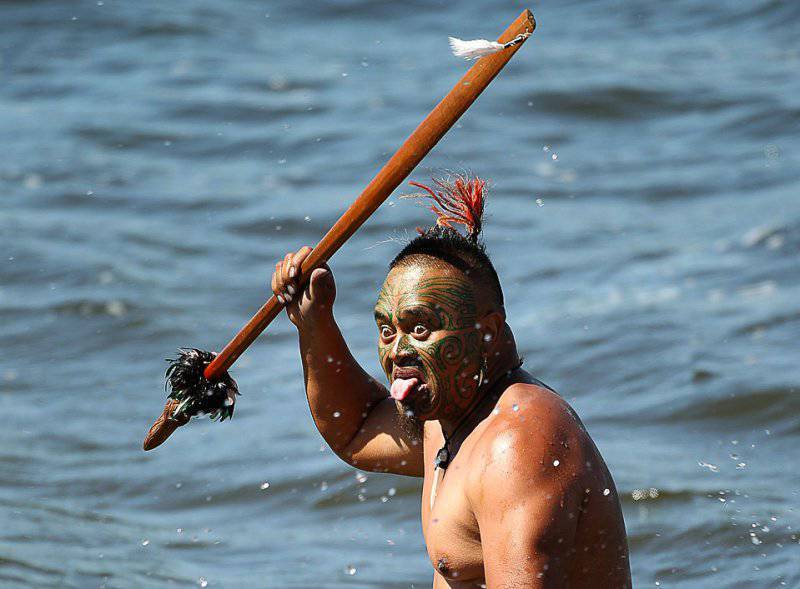
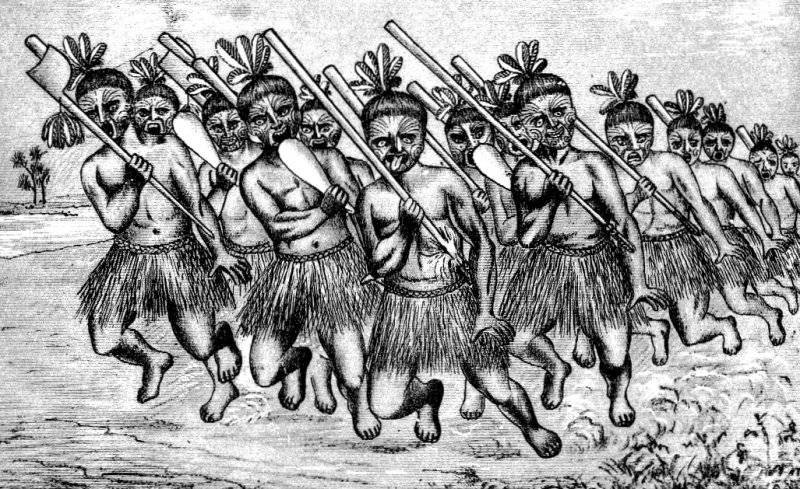
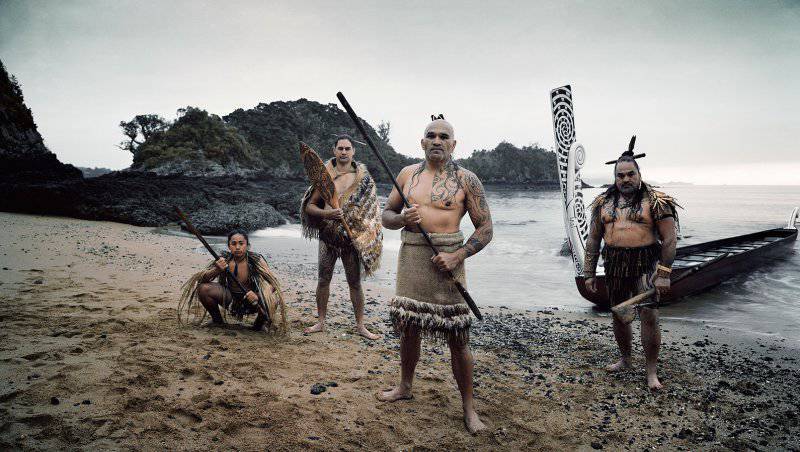
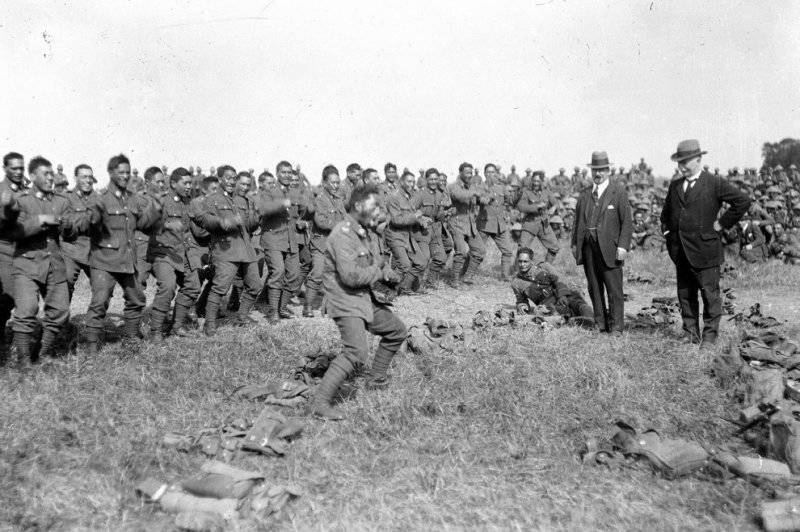
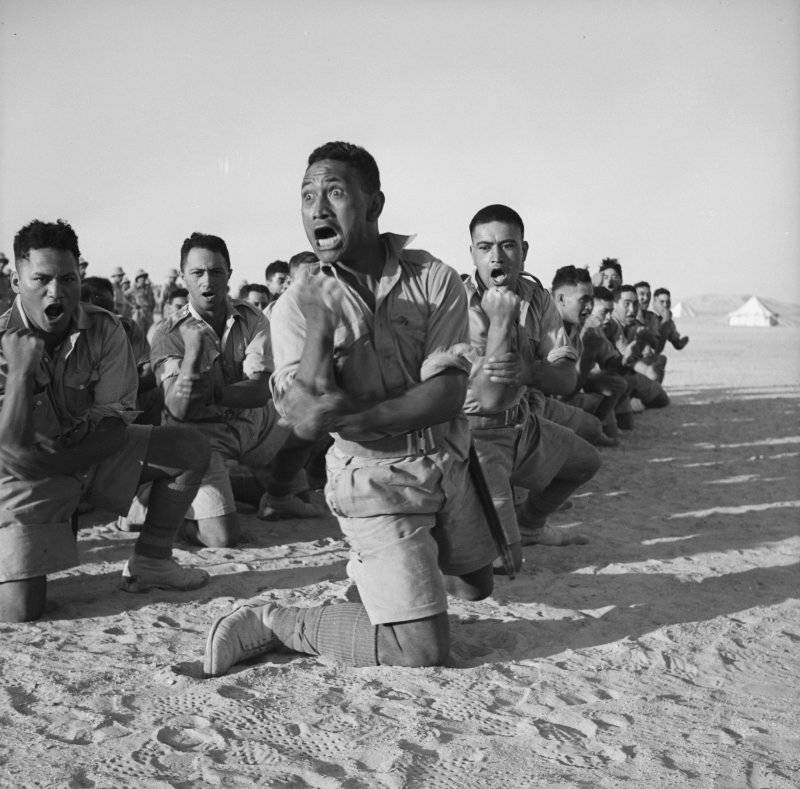
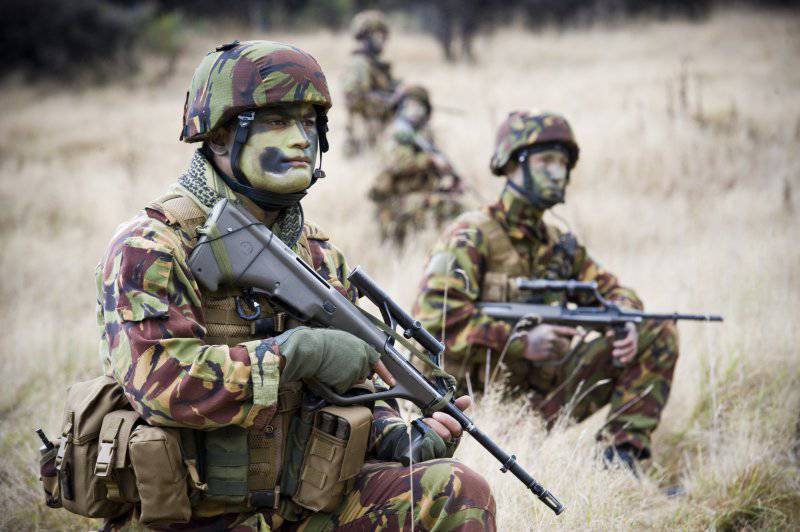
Information